The new onion processing factory of MSP Onions in Nieuwdorp is almost serene. Nevertheless, an impressive volume passes through the factory every day with a capacity of 1,000 tons per day with good demand. "In a traditional situation you would work with 70 people, we do it here with seven people and that includes cleaning and technical service," says Lindert Moerdijk. He gave the AGF / FreshPlaza editors a tour of the new automated and sustainable onion factory, where the overarching software layer Eqontrol controls the various machines in the factory's process and takes care of stock management.
In this dream factory, as Moerdijk calls it, he can provide his worldwide customers with programmed quality onions. "Customers in Asia, Africa and Central and South America all have their specific requirements with a corresponding price. We can now serve them perfectly according to their wishes thanks to our internal quality control. The reactions are positive and it feels really great as a seller to do this. The Eqrader is the only machine in the world that can assess the entire onion internally at this rate. Many people say they have quality onions, but with this sorting machine we can guarantee it. The quality sorting is programmed for each customer. how the customer wants to receive the product, accurate to the millimeter and checked internally and externally."
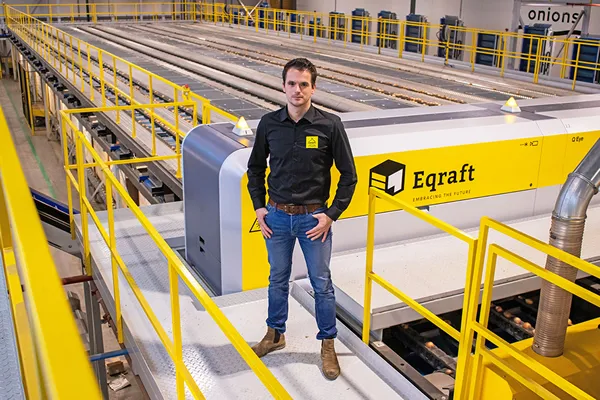
"In this new factory we run from early in the morning until late at night. No human hands are involved, so it's a very Corona-proof, no-touch policy. We have four machines that together can sort 160 onions per second. Six photos are taken of each onion. We select based on seventeen quality qualifications, such as colouring, disease symptoms, hardness, internal and external quality. This makes it easy to select the class I onions from a batch.
"At the end of last season we even had the situation where a customer thought I was kidding him and had delivered a batch of New Zealand imported onions, says Lindert. "Every batch can be traced in Eqontrol thanks to advanced tracking and tracing software. For example, we have a proven tracking & tracing, per onion, per box, per second. This gives us an astounding database. This way we know exactly how. the different varieties and onions from the different growing areas are performing well. "
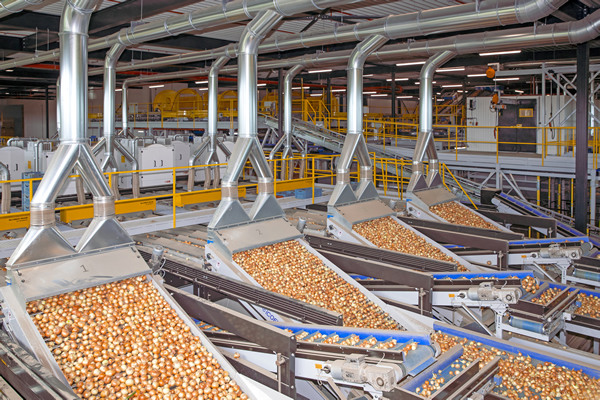
Not a single rotten onion in the bag
In 2010 MSP took the step to start exporting its onions itself as a packing station. The Nieuwdorp company has mastered this trick by now and the onions are shipped all over the world all year round. Thanks to the new factory, the company also hopes to gain attention in the supermarket channel. "We can guarantee a supermarket - or supplier of a supermarket - that there will not be any rotten onion in its bag. When I sometimes see onions lying on the supermarket shelf, I get tears in my eyes. Thanks to this programmed quality sorting, that is a thing of the past. I expect that this technique will revolutionize the shelf and that within two years every supermarket in Europe will make it a condition that all onions have been checked for internal quality. "
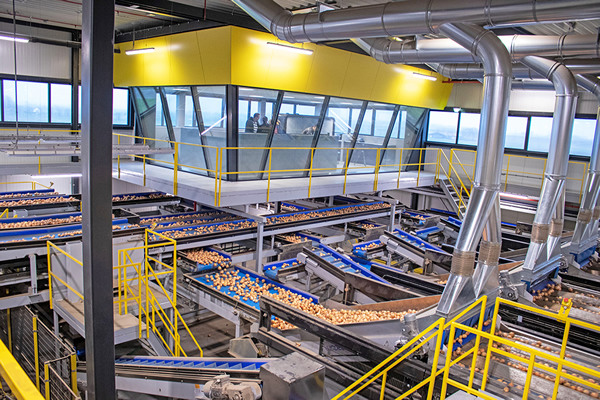
"In addition to a wealth of data, this also provides great export opportunities. We can open new sales areas and supply the existing areas for longer. For example, I now send onions to certain destinations, where I previously really did not dare with a transit time of five weeks. Like when Brazil comes onto the market, for example, I do not have to worry about discoloration, but we can go full throttle. It is a matter of programming out those few onions that are too dark and what remains is a fantastic batch. This is immediately an added value for the grower who does not need to have 100% suitable onions, but can also get added value if the color of his batch is 90% suitable. Especially in the spring when many countries often switch to onions from other countries for quality reasons, this becomes very interesting if we can therefore guarantee top quality," says Lindert, while he automatically orders three different samples from the control room. "All from the same party, they used to leave as one party. Now we are sending them to three different customers, all of whom are very satisfied with it."

"In addition, I firmly believe in the principle of machine learning. Our Profix ERP is now directly linked to the machines via Eqontrol. For example, a trailer can be linked to my sorting programme with one mouse click and we have virtually no changeover time. Based on parameters dictated by purchasing. Eqontrol then sets the speeds and determines the routes needed to sort the trailer as efficiently as possible. On the output side, it then continues and Eqontrol sets the receipts of the entire packing department on the basis of the order data. The software determines the moment from starting the processing of the order, from retrieving the appropriate product from the warehouse to setting up all machines in the line. A fantastic combination of new software techniques that reduces downtime and makes mistakes a thing of the past. "
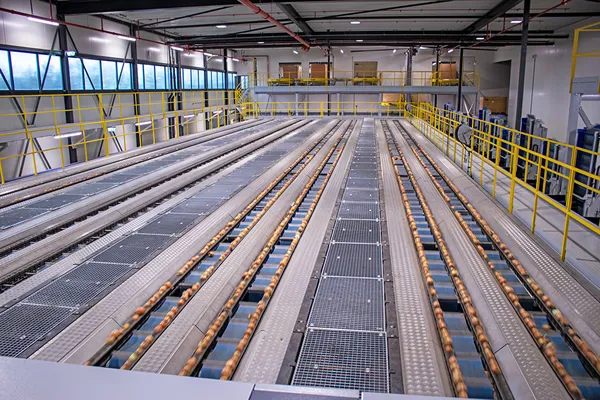
"An additional advantage is that performance is now transparent and schedules are updated live. Now we really know everything, while traditional sorting and packaging was a black box where assumptions were used. I want the role of operator to no longer be so determining. One wrong setting on any machine in the line is already causing a huge disruption. It has to be removed! It simply has to be able to pack 120 tons of onions per hour in peace and quiet and in fact have only three options: start, stop and pause," laughs Lindert.
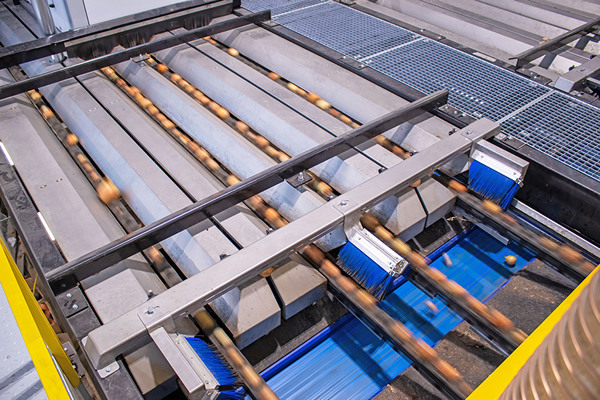
Artificial Intelligence has been mentioned by Lindert for years as the big difference for sorting onions. "To make optimal use of that, you need a lot of exits. Sixteen exits is not a luxury if you know that the waste onions are already programmed in three types. We started at the beginning of September and the margin of error was 2% because the neural networks were not yet available. trained for certain syndromes. We are now at 0.2% and that percentage is only getting lower," says Moerdijk.
"For retail customers we now set up the machine in such a way that it is 100% right, in terms of colour, size and internal quality. Although this company has decades of experience in sorting onions, the machine judges more accurately than meets the eye. The margin of error of the machine is considerably lower and the machines can also be used every hour of the day."
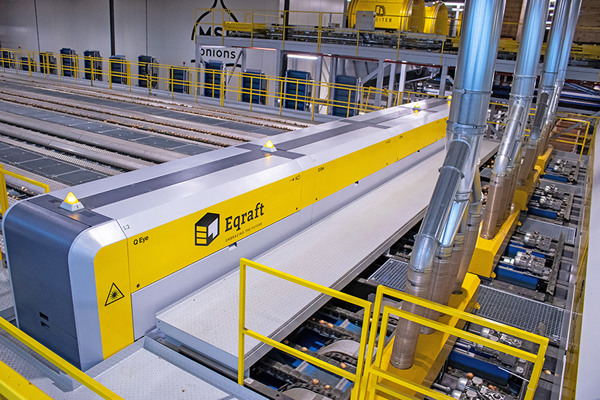
Circular production process
When asked whether there are many onions that are left out, Moerdijk answers in the negative. "In fact, we are increasingly moving towards a circular production process without food waste. We have included waste separation in every phase of the design. As a traditional sorter, you have one big pile of leftover, but that food waste is a thing of the past. Of the onions that in the past were sorted out, 75% are now processed into food and the remaining 25% goes into the bio-digester. This is also positive for the grower. The sustainability of agriculture and the more extreme weather conditions are still creating more uncertainty. This factory can really add a lot of value for the growers."
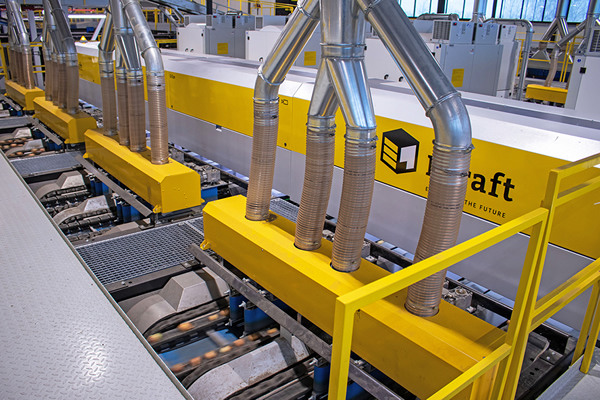
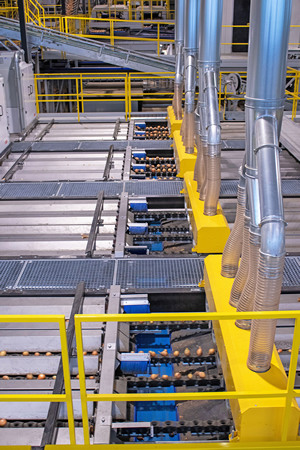 The storage is based on a condensation drying system and the entire factory is fully electric. The onions are picked from an automatic warehouse, referred to by Moerdijk as a black box. "MSP has been able to come up with the 'rules' of the warehouse itself and Eqontrol has given substance to this. On a dashboard we can now see the stock accurately to the kilo live without the operators having to know where it is located in the warehouse. This was a special experience and incomparable with the traditional working method. As a seller I also have the dashboard open and I can see exactly what can be sold. As a result, the current floor area of 13,000 m2 on several floors has remained relatively limited in view of the capacity. save 60% on internal logistics movements. If we had worked in the traditional way, we would have needed three times as much space," says Lindert.
The storage is based on a condensation drying system and the entire factory is fully electric. The onions are picked from an automatic warehouse, referred to by Moerdijk as a black box. "MSP has been able to come up with the 'rules' of the warehouse itself and Eqontrol has given substance to this. On a dashboard we can now see the stock accurately to the kilo live without the operators having to know where it is located in the warehouse. This was a special experience and incomparable with the traditional working method. As a seller I also have the dashboard open and I can see exactly what can be sold. As a result, the current floor area of 13,000 m2 on several floors has remained relatively limited in view of the capacity. save 60% on internal logistics movements. If we had worked in the traditional way, we would have needed three times as much space," says Lindert.
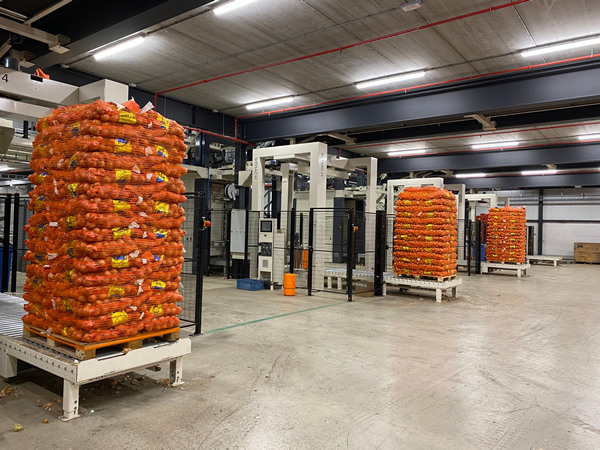
He hopes that the entire Dutch onion sector will get a boost from this investment of approximately 20 million euros. "About forty Dutch onion processors have been working in the same way for decades, at the same cost price and also largely to the same customers. The changing climate with long wet and dry periods requires a quality impulse, which could not be absorbed by manual sorting. But while many new demands are being made of farmers, the processors have lagged behind. In our view, we are not going to win the world with this and that gave the incentive to set up this project. Let the sorting and packaging process become Planet Proof! Our sustainability requirement may become stricter than a BRC certificate."
For more information:
Lindert Moerdijk
MSP Onions 
Hertenweg 32a
4455 TL Nieuwdorp
lindert@msp-onions.nl
www.msp-onions.nl
